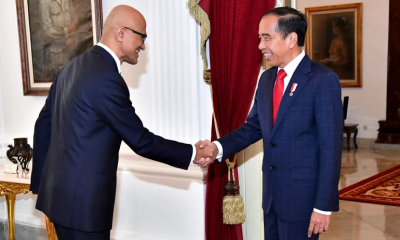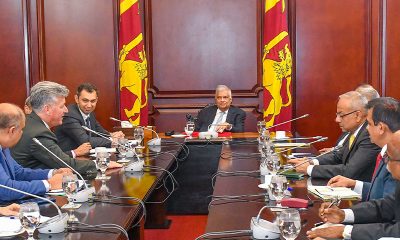Midweek Review
Artificial Intelligence: Are we getting into it with our eyes open?

by Prof. Janendra De Costa
Senior Professor and Chair of Crop Science, Faculty of Agriculture, University of Peradeniya
Artificial intelligence (AI) seems to be the ‘in-thing’ these days, especially for the President of Sri Lanka, who keeps mentioning it in his speeches as a key ingredient for Sri Lanka to achieve prosperity, both economic and otherwise. Taking the President’s cue, the Minister of Education and Higher Education recently went on record saying that AI will be taught in schools from the lower secondary grades upwards in the near future. The potential of AI for improving the efficiency and effectiveness of activities in a wide range of areas that contribute to overall national development, prosperity and well-being is undisputed. However, to treat AI as a ‘silver bullet’ which would cure Sri Lanka from all the complex issues that it is mired in and propel its economy towards development and prosperity is a fallacy that we would do well to avoid. I do not have any claim to be an expert in AI and I welcome its introduction to our curricula, at secondary and tertiary levels, just as I would welcome any other modern advance in Science and Technology (S & T). Nevertheless, the purpose of this article is to focus the readers’ attention on concerns raised by experts on the potential limitations and pitfalls of adoption of AI without being fully aware of its inherent limitations and potential threats. This would be especially relevant for Sri Lanka, which has a history of adopting (and failing) new technologies rather ‘blindly’ and without developing a strong foundation to sustain them. In writing this cautionary note, I have drawn heavily from a recent editorial of the prestigious science journal Nature and some recently published papers, views and opinions in highly recognized S & T research journals, which indicate that this is a global issue, likely to influence both the developed and the developing world.
What is artificial intelligence?
In its simplest sense, artificial intelligence employs a computer, or a robot fed with a series of instructions, to carry out tasks that are normally performed by humans. These tasks can range from simple ones such as writing a letter to complex functions such as designing proteins, pharmaceutical drugs or whole experiments and running laboratories. The capability of AI tools and methodologies to process a quantity of information, which is substantially larger than what an individual human brain (or mind) is capable of processing and finding the best solution in a given situation (called ‘optimization’ in AI terminology) is claimed as a major advantage of AI. The AI tools run on algorithms (series of specific instructions) which are designed to make decisions and carry out functions as done by humans, but with substantially greater effectiveness and efficiency because of their capacity to overcome limitations of an individual human brain (e.g. analyzing the outcomes from a wider range of possible scenarios). To enable them to do this, the AI tools and their algorithms are ‘trained’ on a sufficiently large set of data (often called ‘big data’), supposedly representing all possible scenarios. For example, by being trained on the past data on auction sales of tea in global markets, AI could be used to predict the future market trends for Ceylon Tea. This is an example of what is called ‘Predictive AI’. While a competent economist or a statistician could do the same task using a reasonably large data set, the argument for using an AI instrument would be that it is able to process a much larger and a more varied and complex data set and come up with more precise predictions for a wider range of future scenarios. Recently, a final year undergraduate of my faculty, under the supervision of one of my colleagues, developed an AI tool to grade big onions into categories with greater precision and efficiency than is currently done by traders. In developing the AI tool, it was trained on a wide range of images of onions linked to their physical characteristics such as size, shape and surface properties. Perhaps the best illustration of the power of AI is the computer trained on a multitude of chess moves beating the World Champion in chess.
Potential for AI applications in Sri Lanka
As identified by the President, there is potential for application of AI to improve the efficiency of many activities in a range of sectors in Sri Lanka. Decision-making has been a particularly weak link in the administrative structure of Sri Lanka at all levels, from the President, Cabinet and Ministerial down to the lowest levels of governance in almost all institutions across all sectors. Key decisions on policy and action are often taken without proper consideration and analysis of relevant facts and figures, with personal bias coming into decision-making most of the time. Even when the so-called experts are employed as advisors, their capacity to analyse all relevant information and provide unbiased advice and guidance in decision-making has been questionable at best, and woefully inadequate at worst. The decision to convert Sri Lankan agriculture to 100% organic overnight is a clear recent case in point, which illustrates the inherent weaknesses in the decision-making process at the highest level of governance in Sri Lanka. Apart from its capacity to process a large amount of varied information, a perceived advantage of AI is its impartiality and hence the avoidance of personal bias, which is inherent in human decision-making. In a future ideal Sri Lanka where AI tools in all important sectors abound, perhaps the people in key governance positions (if they ever become sufficiently mature and S & T savvy) could rely on AI to provide sound, evidence-based, unbiased advice during decision-making on key policies and actions.
Similarly, one can ask whether AI can provide solutions to some of the critical issues and improve efficiency in key areas related to economic development. Collection of taxes and government revenue, identification of effective measures of poverty alleviation, land use planning, agriculture and natural resource management, medical supplies and health care, policy and planning on education reforms and management of educational resources, innovations in developing globally competitive products, goods and services and research in all key sectors related to national development are just a collection of areas (by no means exhaustive) which appear to be having limited efficiency when handled by humans so that appropriate AI tools and technologies could make a significant positive impact on the national economy. Furthermore, ideally, the AI tools should be able to make more accurate predictions than those that are currently available about short-term weather, long-term future climate and the occurrence of extreme climatic events such as floods, landslides, droughts and heatwaves. National issues of equal significance such as prediction of outbreaks of climate-related diseases such as dengue could benefit from the greater predictive power offered by the AI tools.
Potential pitfalls and inherent limitations of AI
International research literature abounds with recent advances in the development and application of AI in a wide range of disciplines and activities, almost all demonstrating greater competence and efficiency than the existing technologies and practices. However, there are also a lesser number of papers which focus on the inherent limitations of AI and potential risks of its increased adoption. A few of the key issues are outlined below.
Fundamentally, an AI tool is dependent on the algorithm and the set of source data on which the algorithm is ‘trained’. Absence of adequate amounts source data which is sufficiently comprehensive is likely to be a major drawback when developing AI tools to improve the efficiency of any given sector in Sri Lanka. Here, the natural tendency and the pathway of least resistance, especially for Sri Lankan officials and experts, would be to use AI tools developed in and trained on source data from other countries. While it could be argued that such AI tools are ‘trained’ on source data which are sufficiently extensive, there will always be the question whether the source data adequately captured the whole gamut of conditions, that may be specific, and in some cases unique, to Sri Lanka. Consequently, an AI tool trained on inadequate or poorly representative source data, when used without adequate knowledge and understanding of the underlying mechanisms and processes on which the AI tool is developed, could provide solutions that may not be the best (or optimum) despite conveying the illusory promise of being the best. As a solution to the inadequacy of source data on which to train AI tools, AI, itself, can expand its source database by identifying underlying patterns and the distribution of the existing data and subsequently generate new data. This is part of ‘Generative AI’, which has developed to such an extent that AI can generate ‘respondents’ for (socioeconomic) surveys who would respond to questionnaires in the same way that human respondents would respond. Nevertheless, the fundamental limitation of inadequate source data is likely to remain in many key sectors in Sri Lanka because successive Sri Lankan governments have never invested enough on gathering sufficient and comprehensive information and quantitative data on which to base its policy formulation and decision-making.
A key advantage of the use of AI in decision-making is its perceived absence of personal bias. However, it has been observed that this perceived absence of bias is not always true when AI is applied. When developing the AI algorithms and training them on source data, the developer makes a number of decisions and choices, which inevitably introduces personal bias into the AI tool. When such AI tools are used by end-users who are not familiar with the process through which the model was developed (which is highly likely to be the case in Sri Lanka), the bias inherent in the model leads to outcomes and decisions which favour some views, groups and outcomes while marginalising the alternative, sometimes more valid and inclusive, views and outcomes.
The greater computational power of an AI model trained on ‘big-data’ and providing an output which is more comprehensive than a human-generated output could create an illusion that that AI provides a solution with a superior understanding of the whole scope of the problem. However, the decisions and choices made during the process of algorithm development imposes a limit to the scope of understanding of the AI tool and the solutions provided by it.
Generative AI tools using Large Language Models (LLMs) such as GPTs have already become a common tool among Sri Lankan university students who use it for writing tasks ranging from an email to a report that is submitted for evaluation. This has created a dilemma in the academia on how to evaluate the true competence and the learning outcomes of a student. The capacity of students to synthesise by integrating information from different sources, a key competence that we as academics try to inculcate in our students, is taken away when he/she takes the easy route of using a generative AI tool such as ChatGPT. In an on-going curriculum revision in my faculty, there are colleagues who argue that subject content that can be learnt via generative chatbots such as ChatGPT need not be included in the curriculum. This is a clear example of the illusion of complete understanding that is created by AI tools, which engenders complete trust and reliance on them. The LLMs are trained on increasingly large sets of words and expressions and are increasing their capacity to capture human capabilities. However, even though the creators of AI tools may argue to the contrary, it is doubtful whether generative AI tools, however advanced, could replicate the creativity of the human mind. On the other hand, students hooked on to generative AI tools could create a future generation and a nation with diminished creativity, which would be counterproductive to the very objective of introducing AI to bring about national development and prosperity. There is evidence that students in Sri Lankan universities, both state and non-state, are already hooked on these generative AI tools for producing their take-home assignments and reports. It can be argued that such AI tools ‘levels the playing field’ for those students who are dis-advantaged when they enter a higher education institution due to lower competence in the English language. However, an equally valid counter argument would be that the availability of AI tools is likely to hinder the development of the skill of English usage.
On the global stage, risks posed by some of the latest developments in AI have been recognized and articulated. For example, the potential threats to biosecurity posed by AI-designed proteins and drugs by causing more potent diseases have been recognized. There is the possibility of algorithms that are developed initially for a legitimate purpose being adapted (‘repurposed’) for an alternative not-so-legitimate purpose. The newly developed text-to-video AI tool can create fake videos, which can be used for many harmful purposes. For example, such fake videos of key public figures could shift public opinion in crucial events such as elections. A recent research study has shown that chatbots based on Large Language Models (LLMs) show clear inherent racial bias because of the way the algorithm has been trained to recognize words, phrases and dialects used by specific ethnic or demographic groups and link them to a range of characteristics of those groups, as perceived by the developers of the AI tool.
An important social issue that is inherent when AI gains recognition and trust as a superior partner in generating solutions is the creation of a favoured group of professionals and scientists, especially when it comes to allocation of limiting state resources such as funding for Research and Development (R & D). Creation of such favoured ‘monocultures’ of professionals was evident in Sri Lanka during periods when specific disciplines were earmarked by those who were in power and had the authority to decide on who gets the resources on a priority basis. Clear cases in point were the scientists engaged in nanotechnology, and to a lesser extent biotechnology in the 2000s and the so-called experts in organic agriculture in the recent past. Creation of such favoured monocultures have adverse long-term consequences on national development as it leads, inevitably, to marginalisation and detriment of R & D in other disciplines and demotivation of their practitioners. Looking at what happened in the past, there is a clear and present danger of this history repeating itself in the next few years when AI is viewed as the ticket to economic development and prosperity. The multi-faceted and holistic nature of the development of any nation, irrespective of its present economic status, requires a reasonably adequate allocation of its limited resources across all disciplines of S & T even when a greater proportion of the resources are allocated to a few favoured disciplines which are perceived as having a greater potential to contribute to national development. (To be continued)
Additional Reading
1. Why scientists trust AI too much – and what to do about it. (Editorial). Nature, 627: 243. 14 March 2024. https://doi.org/10.1038/s41586-023-06221-2.
2. Alvarado, R. (2023). What kind of trust does AI deserve, if any?. AI and Ethics, 3(4): 1169-1183. https://doi.org/10.1007/s43681-022-00224-x.
3. Carroll, J. M. (2022). Why should humans trust AI?. Interactions, 29(4), 73-77. https://doi.org/10.1145/3538392.
4. Krenn, M. et al. (2022). On scientific understanding with artificial intelligence. Nature Reviews Physics, 4(12): 761-769. https://doi.org/10.1038/s42254-022-00518-3.
5. Messeri, L. & Crockett, M.J. (2024). Artificial intelligence and illusions of understanding in scientific research. Nature, 627: 49-58. https://doi.org/10.1038/s41586-024-07146-0.
6. von Eschenbach, W.J. (2021). Transparency and the Black Box problem: Why we do not trust AI. Philosophy & Technology, 34: 1607–1622. https://doi.org/10.1007/s13347-021-00477-0.
7. Wang, H. et al. (2023). Scientific discovery in the age of artificial intelligence. Nature, 620: 47-60. https://doi.org/10.1038/s41586-023-06221-2.
The writer is a Fellow of the National Academy of Sciences of Sri Lanka and has been an academic and a research scientist in Agriculture and Natural Sciences for over three decades while being based in Sri Lanka.
Midweek Review
House erupts over Met Chief’s 12 Nov unheeded warning about cyclone Ditwah

Pakistan arranged a series of C-130 humanitarian flights to transport the Urban Search and Rescue (USAR) team, fully equipped field hospitals, and approximately 100 tons of relief assistance. Pakistan, whose assistance during the war prevented the breaking up of Sri Lanka, also directed a Pakistan Navy Ship (PNS), that was here to participate in the International Fleet Review to mark Sri Lanka Navy’s 75th anniversary, to engage in humanitarian operations. The Pakistan High Commission here said that the vessel’s onboard helicopter was deployed for relief and rescue missions, in coordination with Sri Lankan Forces, extending crucial aerial support to affected areas. (At the time this edition went to press, Pakistan hasn’t been able to dispatch the aid aircraft due to India not granting sufficient time to carry out the movement, Pakistan HC in Colombo alleged. India earlier said that approval has been granted for Pakistan to fly over India)
The year 2025 ends with devastating loss of lives and property, both private and public, as a result of floods and landslides triggered by Cyclone Ditwah.
Social media erupted over accusations that the National People’s Power (NPP)government failed to issue a proper warning, in spite of the Director General of the Meteorology Department, Athula Karunanayaka, declaring the impending unprecedented danger.
Karunanayaka made the deadly prediction on 12 November on ‘Big Focus.’ He said so responding to ‘Big Focus’ presenter Kalindu Karunaratne.
Karunanayake didn’t mince his words when he warned of the impending catastrophe. The top official warned that the situation could take a turn for the worse on or after 14 November. Declaring that the threat could progress rapidly though it may not happen on 14 November, Katunanayake said at that moment he wouldn’t call the development a cyclone.
Cyclone Ditwah made landfall on 27 November, two weeks after DG Karunanayake’s warning.
Some compared the alleged lapse with the failure on the part of the Yahapalana administration to thwart the 2019 Easter Sunday carnage, though the powers that be received actionable intelligence.
The nearly one-hour long programme entirely dealt with the developing weather situation. The Director General of the Disaster Management Centre (DMC), Major General (retd.) Sampath Kotuwegoda, and scientist Imaya Ariyarathna of the National Building Research Organisation (NBRO) joined the discussion.
What really prompted ‘Big Focus’ to invite them for a discussion on weather at a time when much more interesting developments were taking place, with a section of the Opposition planning the Nugegoda protest. Let me emphasise that the Meteorology Department comes under the purview of the Ministry of Defence (MoD) and it works closely with the DMC. President Anura Kumara Dissanayake is the Minister of Defence, while his deputy is Major General (retd.) Aruna Jayasekera. The Secretary to the MoD is celebrated helicopter gunship pilot, Air Vice Marshal (retd.) Sampath Thuyakontha.
It would be pertinent to ask whether the Meteorology Department alerted the Defence Ministry, in writing, regarding the impending threat. Had DG Karunanayake been so sure of the developing threat shouldn’t he have advised the government immediately? In addition to DG Karunanayake, it would be necessary to inquire into the DMC’s response and that of NBRO as both organisations had been represented at the discussion.
In fact, the Metrology Chief should have advised the government of the developing situation before he appeared on ‘Big Focus.’ What did the Metrology Department, the DMC and NBRO do over the next 10 days before Cyclone Ditwah ravaged Sri Lanka?
Instead of demanding a Parliamentary Select Committee (PSC) to ascertain the overall failure of those responsible to act on available data, the main Opposition Samagi Jana Balawegaya (SJB) pursued a politically motivated agenda. Finally, the SJB forcefully raised the issues at hand in Parliament on 01 December. The government struggled to cope up with Opposition accusations.
A section of the Opposition sought to take political advantage of the developing crisis by demanding the cancellation of a national programme called the ‘Sri Lankan Day’, meant to foster unity and understanding among the country’s diverse communities and utilisation of the funds, allocated for that project, to provide urgently required assistance for the needy.
Buddhasasana, Religious and Cultural Affairs Ministry has been tasked with implementing that programme, which is scheduled to take place on 12, 13, and 14 December, 2025. The Opposition should have pressed both the government and DG Meteorology as to how specific warnings weren’t issued at least in the wake of the ‘Big Focus’ disclosure.
Political conspiracy
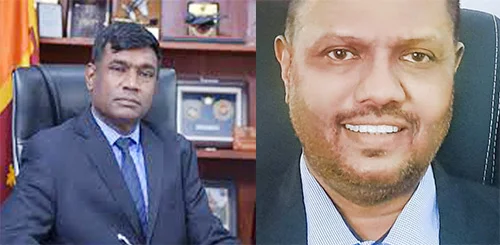
Sampath Kotuwegoda / Athula Karunanayaka
Lawyer and political commentator Nayana Tharanga Gamage lambasted Derana over repeating that segment of the programnme where DG Karunanayake issued the warning. Gamage found fault with the television channel for its reportage while raising the possibility of that channel propagating anti-NPP government propaganda for the benefit of Derana Chief. Gamage was referring to Sarvajana Balaya leader and its only MP Dilith Jayaweera (National List).
Referring to previous instances of the media exploiting crisis situations, Attorney-at-Law Gamage, in his regular social media comment that always addressed issues, lambasted Derana for its reportage of Cyclone Ditwah.
However, the failure on the part of the SJB, and those who organised the Nugegoda rally, to take up vigorously the disclosure made on ‘Big Focus,’ is quite disappointing. All three institutions that had been represented at the discussion with Kalindu Karunaratne owed an explanation and apology as to why absolutely no action was taken until Cyclone Ditwah struck Sri Lanka.
Had the JVP-led NPP represented parliamentary Opposition, that party would have definitely raised the issue. Even if the irresponsible Opposition so far failed to take up this issue, it would be the responsibility of the government to explain the developments since 12 November.
But even if prior warnings had been issued in the wake of ‘Big Focus’ declaration, the destruction caused to infrastructure and houses/buildings couldn’t have been averted but it could have been minimised and certainly many lives could have been saved. Experts say the impact could have been minimised if the authorities had lowered the water levels in the reservoirs, systematically, much earlier as they had been forewarned of the coming monster storm, instead of suddenly releasing vast quantities of water when things were too late, which caused devastating floods downstream. At the time of writing this, the death toll had passed 800 with bodies of over 400 men, women and children yet unaccounted for, and they may never be found.
The number of deaths caused by Cyclone Ditwah is much more than from the Easter Sunday carnage. Multiple attacks, blamed on the National Thowheeth Jaamath (NTJ), claimed the lives of approximately 270 people, andabout 500 received injuries.
Economic fallout of the devastation caused by Cyclone Ditwah has to be ascertained. The national economy, still struggling to cope up with the disgraceful financial status, may experience intensified pressure as the government had no option but to review its overall strategy. The impact on tourism would be devastating as happened in the wake of 2019 Easter Sunday carnage and those who are responsible for managing the economy would be compelled to rethink their economic strategy.
Both the government and the Opposition would have to sink their differences and work together to overcome the developing crisis. The devastation is so huge a reappraisal of budget expenditure, too, may be necessary without delay. Whatever the ruling party politicians may say, it would be prudent to reexamine the arrangement with the International Monetary Fund (IMF) as well as the World Bank and other lending bodies as to how the 2028 deadline for the resumption of debt repayment can be met.
The reportage of the post-Cyclone Ditwah situation primarily focused on rescue efforts and providing of relief. The long-term impact of the devastation caused seemed to have been conveniently forgotten.
The government should realise that its overwhelming 2/3 majority in Parliament does not mean anything. In fact, the re-building of public infrastructure and private property would pose such an intimidating challenge, the NPP, perhaps, may have to change its priorities and think of short, medium and long-term plans to revive the national economy, especially the agriculture sector, which received a body blow as never before.
The urgent need to examine the devastating impact of the disruption of overland main roads, leading to/from the upcountry region, cannot be overemphasised. Unfortunately, the powers that be seemed to be interested in the basic coverage of the post-Cyclone Ditwah developments.
It would be interesting to know whether the Meteorology Department alerted the Examination Department regarding the developing situation before or after the ‘Big Focus’ discussion or never bothered to do so before Cyclone Ditwah swooped down on Sri Lanka. The failure on the part of the Meteorology Department to do so cannot be pardoned under any circumstances. The DMC is also equally responsible for the lapse as its head, Major General (retd.) Kotuwegoda, had been part of the ‘Big Focus’ panel.
The Advance Level examination commenced on 10 November, two days before the Meteorology Department issued a warning. Regardless of assurances given by the Examination Department, the government would find it extremely difficult to re-schedule the examination which was earlier scheduled to be completed on 05 December. Let us hope Advance Level candidates weren’t among the dead and those disappeared.
Operation Sagar Bandhu
In line with India’s ‘Neighbourhood First Policy’ New Delhi acted swiftly and decisively in the wake of Cyclone Ditwah strike.
Aircraft carrier INS Vikrant and INS Udaygiri — the second ship of Project 17A’s stealth frigates that arrived in Colombo to participate in the International Fleet Review (IFR) to mark Sri Lanka Navy’s 75tth anniversary that was to be held on 30 November brought in urgently needed supplies for Sri Lankan victims. India seemed to have been aware of the developing threat and brought in essential items which were handed over to Sri Lanka. The vessels that were sent here to participate in the IFR, according to a press release issued by the Indian High Commission in Colombo, carried 4.5 tons of dry rations and 2 tons of fresh rations, consisting of staple foods, packaged and ready-to-eat items, dairy and bakery products, beverages, and other nutritional essentials to meet urgent household needs. In addition, the vessels delivered other essential survival items.
Chetak helicopters were launched from INS Vikrant to airlift those who had been marooned while Mi 17 helicopters of Indian Air Force (IAF) conducted search and rescue operations over the last weekend near the inaccessible Kotmale area, saving stranded persons, including pregnant women, infants, and those critically injured. The IHC declared that those who had been rescued consisted of Sri Lankans, Indians, Germans, Slovenians, British, South Africans, Polish and people from Belarus, Iran, Australia, Pakistan and Bangladesh. Further, the helicopters also airlifted critical casualties to Colombo as well as carrying Sri Lankan Army personnel to landslide affected regions.
Obviously, Sri Lanka couldn’t have faced the dire situation without Indian assistance. The Indian response is very much similar to the action during the economic crisis here a few years back. It would be also interesting to examine whether against the backdrop of the scheduled IFR, Navy Headquarters sought clarification from the Meteorology Department regarding the 12 November Cyclone warning. The Navy couldn’t go ahead with the IFR with the participation of eight warships from seven countries.
Two IAF aircraft, a C-130J and an IL-76, brought in approximately 21 tonnes of relief supplies, along with 80 personnel from the National Disaster Response Force (NDRF). They were deployed in Puttalam and Badulla, two of the worst-affected regions. Subsquently, India sent more assistance, both in the form of men and material. We should also be grateful for assistance provided by India, China, Japan, the US, Australia, UK, New Zealand and others but New Delhi cannot absolve itself of the responsibility for causing terrorism here.
Tragedy
During relief missions on Sunday (30), SLAF lost a pilot, Wing Commander Nirmal Siyambalapitiya, when he was forced to make an emergency landing near the Lunuwila bridge. Siyambalapitiya, with over 3,000 flying hours during his distinguished service, succumbed to his injuries, and had been in command of the Bell 212 altogether carrying five personnel, including a co-pilot.
Against the backdrop of the Commander of the Air Force, Air Marshal Bandu Edirisinghe, ordering the setting up of a board of inquiry to investigate the incident, the government cannot ignore the need to probe the failure to act in spite of the Met Department issuing warnings.
Five SLN personnel, attached to the Chalai detachment, in the Vettilaikerni sector, also died, on Sunday, when they were caught in flood waters.
In spite of the setbacks, the war-winning armed forces sustained relief and rescue efforts in virtually all affected areas. The social media comments on the role played by the armed forces reminded the country again and again how the public are divided over the government’s approach.
Let me be clear, regardless of the issuance of an early warning, floods and landslides were certain to cause catastrophe but some lives could have been saved and household items, and vehicles, moved to safety. The government is accountable for the failure to act on the basis of the Meteorology Department’s assessment.
Some social media posts reminded me of the alleged Helping Hambantota financial scam perpetrated after the 2004 tsunami. International funds that had been sent to the then Prime Minister Mahinda Rajapaksa’s official account were allegedly transferred to a privately-run scheme. That had been a major issue at the 2005 presidential election won by Mahinda Rajapaksa.
Helping the Hambantota scheme caused Mahinda Rajapaksa immense harm. The Criminal Investigation Department (CID) sought permission from the courts to investigate the accounts alleging that there was a breach of trust concerning nearly 83 million Sri Lankan rupees (approx. 820,000 US dollars).
Deputy Solicitor General, Palitha Fernando, who represented the Attorney General, told court that the CID was directed to initiate an investigation after a complaint made by United National Party (UNP) parliamentarian Kabir Hashim.
This transpired when a fundamental rights petition by Mahinda Rajapaksa against the probe by the CID was taken into consideration by the Supreme Court. The then Chief Justice Sarath Nanda Silva is on record as having said the CID seemed to have worked under political influence as there was no written evidence against the then Prime Minister, Mahinda Rajapaksa.
The CJ said President Rajapaksa had to seek legal assistance due to “inappropriate” action by the Criminal Investigation Department (CID). Years later Sarath Nanda Silva changed his stand on this particular case.
The bottom line is the latest calamity has weakened Sri Lanka further. That is the undeniable truth. Whatever the politicians say Sri Lanka faces an uphill task in pursuing economic recovery.
The government may be compelled to cancel a controversial deal to procure over 1,700 diesel double cabs in violation of laid down procedures. We wonder why the government at least did not make any attempt to procure electric vehicles for the government fleet as it would have at least helped to lessen air pollution that many areas of the country has been enveloped in for some time. It would even save the money that would have been spent on costly diesel and engine oil. Perhaps, in economic terms, the devastation caused by Cyclone Ditwah is definitely far worse than the 2019 Easter Sunday attacks. The cost of infrastructure losses is yet to be estimated and appropriate measures taken to restore them. The task seems to be overwhelming, especially against the backdrop of interested parties seeking to take advantage of the calamity.
Maybe we should ask our powerful friends in the West, like the USA, to postpone sending attack helicopters and military transport planes as we are not in any war with any other country, but instead to send us things like medicines that our hospitals are gravely short of. Definitely when we can hardly stand up on our own feet how can we afford to get into scrapes started by others?
Midweek Review
Climate Change, new technology and the future of the world: A turning point for humanity

Climate change is no longer a distant scientific concern; it is now the most urgent global crisis shaping economies, politics, and the daily lives of billions. Around the world, rising temperatures, unpredictable weather patterns, and environmental degradation continue to intensify. At the same time, rapid technological innovation from artificial intelligence to renewable energy systems is transforming how societies respond to this crisis. Nations stand at a historic crossroads, and the choices made in this decade will determine the fate of future generations.
Recent global climate summits, including the United Nations Climate Change Conferences (commonly known as COP meetings), have repeatedly stressed that the world must limit global warming to 1.5°C above pre-industrial levels. Leaders have emphasised rapid decarbonisation, accelerated renewable energy adoption, climate finance for vulnerable nations, and stronger commitments to phase down fossil fuels. While progress has been uneven, these summits have highlighted the dual necessity of environmental responsibility and technological innovation. The message is simple: the world cannot avoid catastrophic heating unless governments, industries and citizens work together guided by science and strengthened by emerging technologies.
Sri Lanka, like many developing nations, stands at the frontline of climate vulnerability. Rising temperatures, severe droughts, floods, landslides, coastal erosion and saltwater intrusion are already affecting agriculture, urban infrastructure, fishing communities, and rural livelihoods. The country’s climatic shifts from prolonged dry spells in the North and East to intensified monsoons in the South and Central highlands reflect broader global patterns. For Sri Lanka, climate change is not an abstract scientific debate; it is a lived reality. The nation’s current experience underscores why strong climate policies and technological investment are essential.
Renewable energy is one of the most transformative tools in the global fight against climate change. Solar and wind power have become increasingly affordable, enabling nations to reduce dependence on fossil fuels. In Sri Lanka, the government has announced long-term plans to increase renewable energy to a major share of the national grid. Projects such as solar rooftop systems, rural micro-grids, large-scale wind farms in Mannar, and community-based energy initiatives are already part of the national strategy. These efforts align with global summit commitments that call for tripling renewable energy capacity worldwide by 2030. As the cost of renewable technology decreases, the possibility of a cleaner, energy secure future becomes more achievable.
Artificial intelligence is another powerful tool reshaping the world’s climate response. AI-driven forecasting models now help predict extreme weather events more accurately, allowing countries to prepare for floods, cyclones, droughts, and storm surges. In Sri Lanka, meteorological agencies increasingly rely on digital modelling to monitor monsoon behaviour, track ocean patterns, and issue early warnings. These systems have saved lives and minimised damage, especially in flood prone districts such as Gampaha, Kalutara and Ratnapura. At a global level, AI is also used to assess emissions, monitor deforestation, optimise farming, and manage energy distribution. As climate impacts grow more complex, digital intelligence will play an even greater role.
Technological innovation is transforming agriculture, a sector deeply affected by climate volatility. Around the world, scientists are developing drought resistant crops, precision irrigation systems, and satellite-based soil monitoring tools. Sri Lanka, where agriculture employs a significant portion of the population, is already experiencing challenges: reduced rainfall in the dry zone, declining groundwater levels, and pest outbreaks linked to warmer temperatures. New technologies notably drip-irrigation, greenhouse cultivation, and solar-powered water management are gradually being introduced to help farmers adapt. International climate agreements emphasise supporting such adaptation strategies, especially for vulnerable nations. With proper investment and training, Sri Lankan farmers can overcome many of the climate driven threats to food security.
Transportation is another key sector undergoing rapid transformation. Globally, electric vehicles (EVs), hydrogen powered transport, and smart public transit systems are gaining momentum. Many countries have pledged, under climate summit declarations, to phase out petrol and diesel vehicles by mid-century. Sri Lanka has shown growing interest in sustainable mobility, with the rising popularity of electric cars, three-wheelers, and commuter buses. Charging stations are slowly emerging, and policy frameworks are being considered to encourage cleaner transport solutions. While progress remains gradual due to economic constraints, the broader global trend signals that the future of mobility will be electric and digitally managed.
One of the most pressing concerns for the future is the rise of climate induced migration. As sea levels rise and extreme weather intensifies, millions around the world face displacement. Small island nations, South Asian coastal regions, and rural farming communities are particularly vulnerable. In Sri Lanka, coastal erosion from Negombo to Jaffna and from Hambantota to Kalmunai poses a serious threat. Saltwater intrusion is already affecting freshwater supplies and agriculture in areas such as Puttalam, Jaffna and Batticaloa. Global climate summit decisions repeatedly call for stronger adaptation funds, coastal protection strategies, and international support for countries confronting such challenges. Ensuring that vulnerable communities are protected will require both technological solutions and sustained political will.
At the heart of climate action lies public awareness. Across the world, young people have become powerful advocates for environmental protection. Climate activism, amplified by social media, has gained unprecedented momentum. In Sri Lanka too, university students, environmental groups, and civil organisations continue to push for stronger climate commitments, better waste management, and protection of natural resources. Their voices reflect a global shift in consciousness, where sustainability is increasingly viewed as essential rather than optional. Digital platforms have played a vital role, enabling activists to educate communities, mobilise support, and hold institutions accountable.
The economic landscape is also changing. Sustainability is now a competitive advantage for businesses. Organisations adopting green technologies, ethical sourcing, and energy-efficient operations are gaining consumer trust and long-term resilience. Global climate summits encourage private-sector participation in climate finance and green investment. In Sri Lanka, sectors such as tourism, manufacturing, agriculture, and energy are exploring new strategies to reduce emissions and strengthen environmental stewardship. Green jobs ranging from solar panel installation to environmental engineering are expanding, offering new opportunities for youth and professionals.
Yet challenges remain. Many developing nations struggle to access cutting edge technology due to limited financial resources. Infrastructure gaps, policy barriers, and economic instability can hinder the adoption of renewable and digital solutions. Sri Lanka’s own economic crisis has slowed the implementation of several climate related projects. Global climate summits have repeatedly emphasized that richer nations must provide climate finance grants, loans, and technology transfers to support vulnerable countries. While some progress has been made, funds often fall short of what is required. Without equitable support, the technological divide could worsen existing inequalities.
As the world looks ahead, the future depends on how effectively humanity can balance technological progress with environmental responsibility. The next decade will be critical. Decisions on energy, land use, industrial development, and digital systems will shape the planet’s stability for centuries. Despite the challenges, there is reason for cautious optimism. History shows that societies are capable of remarkable transformation when confronted with crisis. The rapid rise of renewable energy, global climate agreements, technological innovation, and growing environmental awareness all point toward the possibility of a greener, more resilient future.
For Sri Lanka, the path forward involves strengthening climate adaptation, expanding renewable energy, modernizing agriculture, protecting biodiversity, and ensuring that technology serves communities rather than deepening inequality. Collaboration between government, private sector, universities, and local communities will be essential. At the global level, summits like COP remind the world that climate change cannot be solved by one nation alone. It requires shared responsibility, scientific cooperation, and a commitment to fairness.
Ultimately, the story of climate change and technology is about humanity’s ability to adapt, innovate, and imagine a better future. The window for action is narrowing, but it remains open. The future of the planet and of nations like Sri Lanka depends on the choices made today. With wisdom, courage, and technological vision, the world can still steer toward a safer, cleaner, and more sustainable tomorrow.
Finally, Sri Lanka faces growing climate threats from floods and droughts to coastal erosion and crop losses mirroring global environmental changes. While new technologies and global climate agreements offer solutions, urgent national action is essential. Sri Lanka must strengthen early-warning systems, expand renewable energy, protect coastal zones, and modernize agriculture with climate-smart methods. Reforestation, watershed protection, and stricter land-use regulations are vital to reducing disaster risks. Improved climate education, stronger environmental laws, and sustained community involvement will help build resilience. With coordinated policy, technology, and public commitment, Sri Lanka can face future climate challenges with greater security and sustainability.
by Milinda Mayadunna
Midweek Review
UNP finally admits MR saved country from terrorism
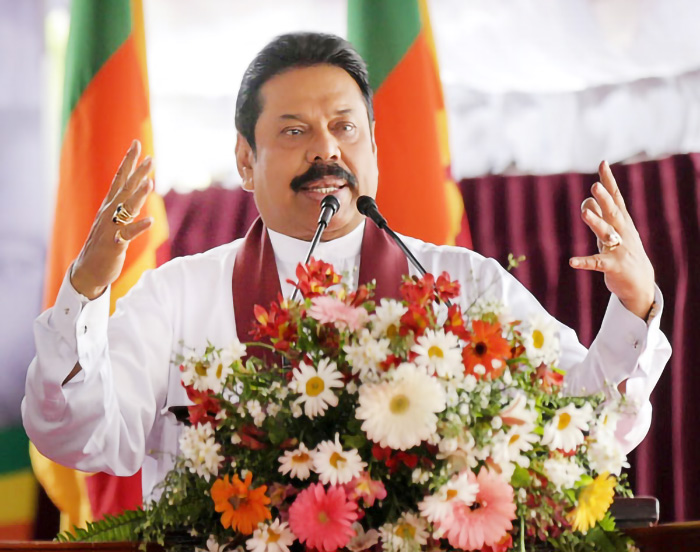
Former UNP Minister Harin Fernando publicly declared for the first time that Mahinda Rajapaksa led the country, ignoring all those pundit nay sayers and brought the war against the Liberation Tigers of Tamil Eelam (LTTE) to a successful end. The ex-parliamentarian also emphasised that Ranil Wickremesinghe restored the collapsed national economy. The UNPer was referring to the crushing of the LTTE militarily in May 2009 and Wickremesinghe completing the remainder of the ousted President Gotabaya Rajapaksa’s 5-year term won at the Nov 2019 presidential election.
Fernando said so addressing ‘Maha Jana Handa’ organised at the Nugegoda Ananda Samarakoon Open Air Theatre last Friday (21). Unfortunately, Fernando’s leader Ranil Wickremesinghe who actually proposed a high-profile joint Opposition campaign against the Jathika Jana Balawegaya (JJB) government and the war winning President Mahinda Rajapaksa conveniently skipped the Nugegoda rally. That, however proved how fed up the masses are with the current dispensation for breaking virtually all their promises by turning right, but nothing to show for it, after signaling left for so long promising a mythical revolutionary state, while causing so much death and destruction along the way with two abortive uprisings. Masses came in record numbers to the Nugegoda rally despite it being led by relative minnows in the opposition.
Wickremesinghe certainly owed an explanation regarding his absence as it was, he who proposed 1,000 meetings against the NPP/JVP government, at the UNP’s 79th convention held on Sept 20, this year at Sri Jayewardenepura Kotte. It was themed ‘Let’s Stand Together.’
The UNP hitherto never publicly acknowledged the fact that Mahinda Rajapaksa’s bold leadership ensured Sri Lanka’s triumph over the separatist terrorist LTTE. The significance of Fernando’s declaration was lost in political rhetoric as speakers challenged President Anura Kumara Dissanayake (AKD). SLPP National List MP and National Organizer Namal Rajapaksa vowed to topple the NPP at the first given opportunity unless AKD fulfilled promises made in the run-up to 2024 presidential election.
Among notable absentees was SLPP founder and former renowned political strategist Basil Rajapaksa. The nonattendance of the main Opposition Samagi Jana Balawegaya (SJB) leader Sajith Premadasa, who is also the Opposition Leader, as well as all constituent members of the SJB underscored the overall weakness of the initiative. The failure on the part of ‘Maha Jana Handa’ organisers to reach a consensus with the SJB regarding a tangible plan of action cannot be overemphasised.
Former Prime Minister and MEP leader Dinesh Gunawardena who backed Ranil Wickremesinghe candidature at the last presidential election also skipped the Nugegoda rally.
The SJB with 40 MPs is the second largest political party in the current parliament. Therefore, the SJB’s absence made the whole effort meaningless symbolically, but the enthusiasm of the massive crowd that converged there, despite all types of impediments put in their way, without doubt once again showed the growing unpopularity of the current dispensation. The SJB is very much unlikely to change its stand regarding participation in the current initiative unless an agreement with the UNP could be finalised. The SJB wouldn’t under any circumstances throw its weight behind any political initiative that failed to acknowledge the situation on the ground.
But the groundswell of disappointment with the JVP led government for having betrayed many of their longstanding ideals and also failing to deliver many of their election promises, may result in even SJB being overlooked by masses for other alternatives.
The UNP doesn’t represent the current parliament whereas Ranil Wickremesinghe backed New Democratic Front (NDF) at the last parliamentary election secured five seats, including two National List slots. The NDF group consists of Chamara Sampath Dassanayake, Anuradha Jayaratne, Rohitha Abeygunawardena, Ravi Karunanayake (NL) and Faizer Musthapha (NL). Of them, only Dassanayake joined the rally where he was one of the main speakers.
Namal Rajapaksa’s SLPP parliamentary group consists of just three MPs, hence the urgent need to bring the SJB into the fold. But that wouldn’t be possible unless ‘Maha Jana Handa’ recognised the SJB’s standing among opposition political parties and groups.
Harin Fernando, tasked by Wickremesinghe to organise countrywide meetings in his fiery speech appealed to the SJB while lambasting the Janatha Vimukthi Peremuna (JVP) for ruination of the country. Let me discuss Fernando’s declaration regarding Mahinda Rajapaksas bringing what the UNP dubbed an unwinnable war to an end and how that party pursued a despicable political strategy at the expense of post-war Sri Lanka.
A relentless offensive
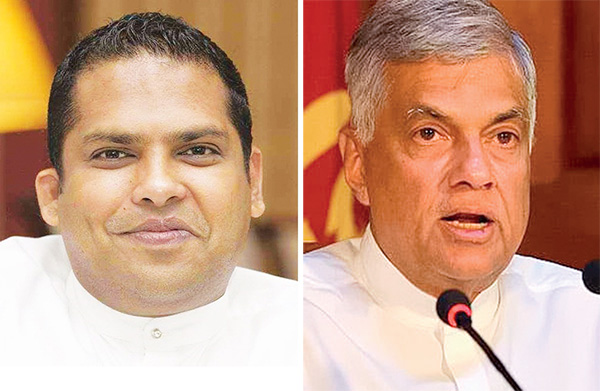
Harin Fernando / Ranil Wickremesinghe
The UNP never believed in battle-field victory over the LTTE. Wickremesinghe operated on the assumption that the LTTE could reverse the ground situation with a devastating counter offensive on the Vanni front. That had been the general opinion among the Western and Indian diplomatic community here and the Tamil speaking community living outside the Northern Province. But those who lived in the North knew that there hadn’t been a similar multi-pronged ground offensive before.
But still the UNP felt that the LTTE could deliver a massive blow on the Vanni front and cause irreparable damage to the war effort. The LTTE’s last desperate bid to regain the initiative went awry in February 2009 and two months later the Army delivered a knockout blow to the enemy at Anandapuram. That was the end of their once formidable conventional military capacity. The destruction of the LTTE floating arsenals on the high seas during 2006-2007 period by Vice Admiral Wasantha Karannagoda’s Navy and the strategic air campaign conducted by the SLAF under AM Roshan Gunetilleke’s leadership facilitated the overall campaign.
Against the backdrop of Harin Fernando’s long-overdue admission, it would be pertinent to mention that President Mahinda Rajapaksa refused to heed combined UK (David Miliband)-French (David Kouchner) demand to halt the offensive. That bid to throw a lifeline to the LTTE was made in late April 2009 as the ground forces were engaged in their final push to break the back of the LTTE as they were cornered into an ever-decreasing patch of land. That courageous decision ensured Sri Lanka’s triumph over terrorism that plagued the country since 1983.
When David Miliband and Bernard Kouchner met President Rajapaksa at Chandrikawewa, the younger man is reported to have brazenly told President Rajapaksa, “Mr. President we want you to agree to a ceasefire. We cannot be passive spectators. There has to be a lull in the fighting.”
President Rajapaksa’s response was: “Secretary Miliband, I want to tell you we are no longer a colony. Empirical experience has shown that ceasefires only prolong the war. It would be a gross betrayal of our country to permit the Tigers to recuperate and return to war – as they have done on countless occasions.”
Historian and the creator of Thuppahi’s blog Michael Roberts revealed the exchange on the basis of what the then Foreign Secretary Palitha Kohana and International Trade Minister Prof. G. L. Peiris had told him (https://thuppahis.com/2018/07/02/how-mahinda-rajapaksa-rebuffed-david-miliband/).
Any other leader would have succumbed to that kind of big power pressure against the backdrop of the US sending a military team here to explore the possibility of evacuating terrorist leader Velupillai Prabhakaran, his family and top lieutenants.
The UNP remained silent about the joint UK-French attempt. Wickremesinghe who always boasts of his close connections with western governments may have been aware of the UK-French bid. Had Wickremesinghe intervened on behalf of the country/armed forces and issued a statement opposing a European backed ceasefire at that time he and the UNP could have saved face. Unfortunately, he played politics with the issue much to their own detriment.
Wickremesinghe went a step further, he joined hands with the Tamils National Alliance (TNA) that represented the LTTE’s interests both in and outside parliament (2001 to 2009) and the JVP to field war winning Army Commander at the 2010 presidential election. In hindsight that decision caused a ripple effect and contributed to the overall deterioration of the political party system.
Harin Fernando’s praise of Mahinda Rajapaksa wouldn’t absolve his party of treacherous betrayal of the victorious armed forces as well as the then political leadership at the Geneva-based Human Rights Council (HRC) in Oct 2015. In fact, the UNP worked closely with the JVP from 2009/2010 to 2019 when the latter decided to quit the alliance to contest the 2019 presidential election.
Lessons from Nugegoda
Among those who had been on the front row of the Nugegoda rally were SLPP General Secretary Sagara Kariyawasam, Prof. G. L. Peiris, Nimal Siripala de Silva, Vajira Abeywardena, Udaya Gammanpila, Tiran Alles, Mahinda Amaraweera, Duminda Dissanayake and Lasantha Alagiyawanna.
Prof. Peiris as the government’s chief negotiator during peace talks with the LTTE between 2002 and 2003 period is one of the few politicians fully aware of the developments that led to breakdown of talks in April 2003 and resumption of war in August 2006. Prof. Peiris also served as foreign minister in the post-war period and was closely associated with efforts to counter war crimes accusations. Harin Fernando’s declaration, about the way Sri Lanka brought the war to a successful conclusion may help the country to counter Geneva war crimes allegations. Unfortunately, the UNP worked overtime against President Rajapaksa thereby betraying the country by co-sponsoring an accountability resolution in Oct 2015.
The JVP though not represented in the cabinet fully backed the Sirisena-Wickremesinghe led yahapalana administration that co-sponsored the Geneva resolution
The Nugegoda rally was silent on the Geneva betrayal. Speakers on the Nugegoda platform couldn’t have referred to that outright treachery in Geneva as the UNP had joined ‘Maha Jana Handa.’ Nugegoda platform was also conveniently silent on ongoing investigations into accountability issues. In fact, ‘Maha Jana Handa’ conveniently avoided contentious issues ranging from Memorandums of Understandings (MoUs) with India in April this year to formalisation of collaboration between the Montana National Guard, U.S. Coast Guard District 13, and the Sri Lanka Armed Forces under the U.S. Department of Defence’s State Partnership Programme (SPP) earlier this month.
Against the backdrop of the UPFA first entering into Acquisition and Cross-Servicing Agreement (ACSA) in 2007 and then UNP-SLFP yahapalanaya extending the same in 2017, Nugegoda platform couldn’t have accused the NPP of undermining sovereignty. Similarly, they couldn’t have attacked the NPP over the IMF agenda as all of them accepted that formula by the passage of the Economic Transformation Bill in July 2024 without a vote.
The failure on their part at least to mention India taking over 51% stake of the Colombo Dockyard Limited (CDL) for USD 52 mn within weeks after the signing of seven MoUs proved that Nugegoda rally simply didn’t take key developments into consideration. The success of a rally cannot be under any circumstances gauged by the presence of a sizable crowd as people do not on their own attend political rallies. The meeting addressed by President Anura Kumara Dissanayake at Tangalle on the day before the Nugegoda rally is a case in point. At least one third of the Tangalle gathering happened to be serving military and police in civies and government officials and the rest brought in by the party. The only difference at Tangalle and Nugegoda had been loud speakers outside the venue at Tangalle whereas ‘Maha Jana Handa’ was denied the same citing the on-going Advance Level examination. NDF lawmaker Chamara Sampath Dassanayake quite rightly pointed out this at the Nugegoda meeting.
The SJB and UNP need to address their internal issues as soon as possible. Sajith Premadasa and Ranil Wickremesinghe cannot further delay in reaching a consensus on the leadership issue. If they do not set aside their petty squabbling for the greater good of the country the people themselves might consign them to the dust bin of history. The setback suffered at Nugegoda must compel them to unify the two parties to face the NPP as the SLPP with just three MPs in current parliament cannot be expected to give leadership to the combined Opposition. It would be a grave mistake on the Opposition’s part to think that it can achieve the transformation of the JVP’s three MPs to 159. Such a massive change would never have been possible without Aragalaya that caused political upheaval and turned the party system upside down.
The SLPP now down to just three from near 2/3 majority in 2020 shouldn’t forget that the indictments were forwarded to the Colombo High Court by the Attorney General in late January this year, alleging that Namal Rajapaksa misappropriated funds to the tune of Rs 70 mn received from the Indian real estate company Krrish for the development of rugby in Sri Lanka.
Disastrous UNP strategy
The UNP still seems unable to come to terms with the situation. In spite of the party being reduced to a nonentity with no parliamentary representation at the moment and no hope of coming back at the next national elections, that party is still trying to reach a consensus with the SJB at the latter’s expense. Their effort is geared to safeguard Ranil Wickremesinghe’s leadership at any cost. They haven’t realised Wickremesinghe’s folly in contesting the last presidential election as an independent candidate thereby causing a split in the vote that ensured Anura Kumara Dissanayake’s victory at the presidential election. Dissanayake polled 5.6 mn votes whereas Sajith Premadasa and Ranil Wickremesinghe polled 4.3 mn and 2.2 mn votes respectively.
The bottom line is that Wickremesinghe and the former UNP deputy leader Premadasa polled 6.5 mn votes, 900,000 votes more than Dissanayake who also failed to secure 50% of the vote. Regardless of that, the UNP pursued a strategy that only helped the NPP to consolidate its position with a resounding victory at the parliamentary election last November, three months after the presidential poll.
Instead of reaching a consensus with the SJB, Wickremesinghe caused political mayhem by contesting under the NDF symbol gas cylinder. That move divided the SLPP, undermined the SJB and delivered a knockout blow to the UNP. The NDF that had never been represented in parliament secured five seats, including two NL slots while the SLPP ended up with just three seats including one NL slot. The UNP that secured one NL slot at the 2020 parliamentary election was reduced to zero at the 2024 general election.
Harin Fernando’s declaration at the Nugegoda rally that Wickremesinghe restored the collapsed national economy is debatable. The Treasury bond scams perpetrated in 2015 February and 2016 March under Wickremesinghe’s watch by Singaporean Arjuna Mahendran who served as the Governor of the Central Bank at that time remains a thorny issue. Having compelled President Maithripala Sirisena to appoint close associate Mahendran as the Governor regardless of him being a foreign passport holder Wickremesinghe cannot absolve himself of the responsibility for Treasury bond scams.
Mahendran was allowed to leave the country. The Singaporean remains at large. Those who now represent the SJB protected Mahendran and engaged in cover up of Treasury bond scams throughout yahapalanaya (2015 to 2019). The then UNPer and current SJB lawmaker Sujeewa Senasinghe went to the extent of authoring a booklet denying Treasury bond scams while others undermined the COPE (Committee of Public Enterprises) process intended to identify the culprits.
The JVP, too, cooperated in that cover-up. It would be pertinent to mention that the JVP transformed the party in 2009/2010 to align with the UNP. That partnership completely changed the JVP. That transformation took place during the late Somawansa’s leadership. Anura Kumara Dissanayake who succeeded Somawansa in 2014 has taken the party to the next level. Securing both presidency and unprecedented 2/3 majority in parliament is certainly not a simple task and he has achieved the impossible as the leader of both JVP and NPP.
However, the President’s continuing success depends largely on the failure on the part of the sharply divided Opposition to reach a consensus on a workable plan of action. The resolution of the SJB-UNP dispute is the key to adoption of a successful Opposition strategy.
-
News6 days ago
Lunuwila tragedy not caused by those videoing Bell 212: SLAF
-

 News15 hours ago
News15 hours agoOver 35,000 drug offenders nabbed in 36 days
-

 News5 days ago
News5 days agoLevel III landslide early warning continue to be in force in the districts of Kandy, Kegalle, Kurunegala and Matale
-

 Latest News7 days ago
Latest News7 days agoLevel III landslide early warnings issued to the districts of Badulla, Kandy, Kegalle, Kurunegala, Matale and Nuwara-Eliya
-

 Features7 days ago
Features7 days agoDitwah: An unusual cyclone
-

 Business3 days ago
Business3 days agoLOLC Finance Factoring powers business growth
-

 News3 days ago
News3 days agoCPC delegation meets JVP for talks on disaster response
-

 News3 days ago
News3 days agoA 6th Year Accolade: The Eternal Opulence of My Fair Lady






